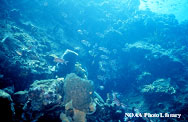You are here: Home › Ecosystems › Coral Reefs › Current Programs › Coral Reef Ecosystems Studies - Caribbean
Coral Reef Ecosystems Studies – Caribbean
“Integrating Science and Management in the Caribbean”
Issue
Coral reefs possess the greatest ecological complexity and biodiversity among marine ecosystems, and represent an invaluable economic and recreational resource. However, the integrity of coral reefs is threatened by numerous anthropogenic and natural stresses including sediments, nutrient enrichment, climate change (coral bleaching), over-harvesting, and storms. Compared to other marine systems, coral reefs may be particularly vulnerable to watershed-based stresses related to coastal development, since coral reefs are usually best developed near areas with low sediment and nutrient input. Over-harvesting may also be particularly hazardous since coral reefs may be highly dependent upon complex biological interactions involving predation, herbivory and competition.
In addition to the separate effects of various stressors, synergistic interactions among stressors can further degrade coral reef health. For instance, overharvesting of the grazers that control algae might allow increased algal cover on the reef which may compromise the resiliency of some reefs to increased nutrient inputs.
Approach

The impacts of anthropogenic effects may be mitigated by implementation of marine protected areas (MPAs). However, the development of sound ecological strategies for management not only requires the analysis of various stresses and biological processes, but also must involve socioeconomic concerns and user-friendly modeling systems to evaluate the efficacy of management options.
The Integrating Science and Management in the Caribbean project will:
- Identify and evaluate factors critical to the decline of coral reefs in the proposed study areas
- Evaluate effective management approaches
- Develop tools to assist resource managers
- Evaluate socio-economic concerns vital to management plans
- Integrate environmental studies, socioeconomic impacts, and modeling into a comprehensive ecological study
The project was initiated in Fiscal Year 2003 as a science-based, integrated approach to understand coral reef dynamics and processes, and to provide tools and options for coral reef management. The program will be based at three sites: La Parguera and Culebra, Puerto Rico, and St. John, US Virgin Islands, all of which contain marine protected areas in various stages of development. Research conducted at these sites will build upon current research and historical data going back 40 years and the comparison of processes (both ecological and social) will result in greater understanding of coral reef function and provide a scientific basis for reef conservation and restoration.
Management and Policy Implications
The research will quantify linkages within the complex association of species, habitats, and social systems, including:
- Land-water interactions, including linking models of terrestrial runoff and coastal zone development
- Linkages among small-scale habitats and large-scale areas within reef developments
- Changes in trophic dynamics (from fishing pressure, etc.) and their effects on reef health and dynamics
- Linkages between human activities and natural systems
 The
program will evaluate alternative management strategies, particularly
the effectiveness of marine protected areas, by comparing the
marine reserves at each of the study sites. Each reserve has
a historical and spatial basis for comparison. The program
will assess the impacts of fishery closure on the reefs themselves
and on the controlling processes (changes in community and trophic
structure), and will evaluate the socioeconomic processes affecting
the implementation and success of each reserve.
The
program will evaluate alternative management strategies, particularly
the effectiveness of marine protected areas, by comparing the
marine reserves at each of the study sites. Each reserve has
a historical and spatial basis for comparison. The program
will assess the impacts of fishery closure on the reefs themselves
and on the controlling processes (changes in community and trophic
structure), and will evaluate the socioeconomic processes affecting
the implementation and success of each reserve.
Finally, the program will develop user-friendly Geographic Information System (GIS) based models as an ecosystem management tool. The models will have a predictive capability, and incorporate terrestrial inputs, current-flow models, trophic models of marine reserves, and integrate natural and social processes and impacts.
Accomplishments
Preliminary accomplishments are now being reported on the Center for Coastal Monitoring and Assessment (CCMA) CRES — US Caribbean Component web site.
For more information contact:

